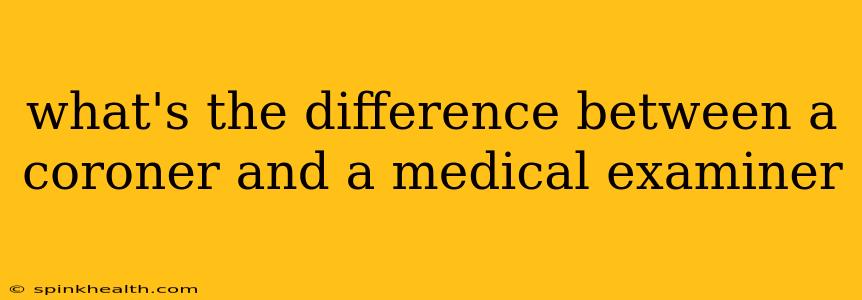What's the Difference Between a Coroner and a Medical Examiner? A Tale of Two Death Investigators
The hushed halls of a morgue, the stark white of an autopsy table… these are the settings where coroners and medical examiners work, unraveling the mysteries surrounding unexpected or violent deaths. But while both roles investigate death, their paths diverge significantly. Let's delve into their distinct roles and responsibilities, a story often shrouded in misunderstanding.
Imagine a small, rural town. Here, the coroner is often an elected official, much like a sheriff or mayor. They might have a background in law enforcement, mortuary science, or even just a deep understanding of their community. Their role is less about the intricate science of death and more about the administrative and legal aspects of death investigation. They might determine if an autopsy is necessary and then oversee the process, ensuring everything is conducted legally and according to the protocols.
Now, picture a bustling city, a place where a large volume of deaths requires a more specialized approach. This is where the medical examiner steps in. Medical examiners are medical doctors, typically with specialized training in forensic pathology – the study of disease and injury in the context of death. Unlike coroners, who are elected, medical examiners are appointed based on their medical expertise. They are responsible for conducting autopsies, analyzing the evidence, and issuing comprehensive reports that determine the cause and manner of death.
Let's break down the key distinctions:
What are the qualifications of a coroner?
Coroners don't need to be medical professionals. Their appointments are often political, meaning they're elected by the community. While some might possess relevant experience like in law enforcement or mortuary science, medical expertise is not a prerequisite.
What are the qualifications of a medical examiner?
Medical examiners are always physicians, typically board-certified forensic pathologists. They possess the medical knowledge and skills needed to conduct autopsies, interpret complex medical findings, and make accurate determinations of cause and manner of death.
What does a coroner do?
A coroner’s role is largely administrative and legal. They:
- Investigate deaths: They determine if a death needs further investigation.
- Authorize autopsies: They decide if an autopsy is necessary based on the circumstances of the death.
- Oversee death investigations: They oversee the legal aspects of the death investigation, ensuring compliance with laws and regulations.
- Issue death certificates: They are often responsible for issuing death certificates.
What does a medical examiner do?
A medical examiner’s role is primarily medical and scientific. They:
- Conduct autopsies: They perform autopsies to determine the cause and manner of death.
- Interpret medical findings: They analyze evidence from the autopsy, toxicology reports, and other investigations.
- Determine cause and manner of death: They provide a detailed report outlining the cause and manner of death.
- Testify in court: They often provide expert testimony in legal proceedings related to the death investigation.
Coroner vs. Medical Examiner: Which System is Better?
The "better" system depends largely on the context. Smaller communities may find the coroner system more efficient and cost-effective. The close ties to the community can offer valuable local insights, especially in death investigations. Larger jurisdictions, however, often benefit from the specialized medical expertise of medical examiners. The thoroughness of their investigations offers a higher degree of accuracy in determining the cause and manner of death, crucial for both justice and public health.
Ultimately, both coroners and medical examiners play vital roles in ensuring that deaths are investigated thoroughly and appropriately. Their differing approaches simply reflect the varied needs and resources of different communities.

